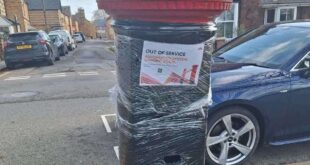In early March we began reporting daily on how brands were dealing with COVID-19. But it’s become clear that the current climate is one of near-perpetual disruption, so we decided to keep on telling the stories of inspiring brand leadership and strategy amid the latest crises in an anxious world. Our goal is to provide an up-to-the-minute source of information, inspiration and insight on brand moves as they happen.
UK postal service Royal Mail has created Online Safe Spaces: a discreet, digital portal designed for those suffering from domestic abuse. Around 61% of UK women who live with their abuser report an increase in abuse due to social distancing restrictions. Created in partnership with crisis organization Hestia, the portal exists on the Royal Mail and Parcelforce websites. It provides information on domestic violence – helping survivors identify whether they’re experiencing abuse, emergency services, when they should involve law enforcement, and more. Additionally, each Online Safe Space is easy to quickly exit and does not show up in browser or search histories. The portal is free for any business to add to its own site. Hestia is also behind the UK SAYS NO MORE initiative, which lets domestic abuse survivors access take shelter at pharmacy retail outlets (including Boots and Morrisons) across the country.
In an effort to help African startups stay afloat, Ventures Platform, an Abuja, Nigeria-based early-stage fund, is creating a startup relief program to disburse emergency grants of up to $20,000 to early, high-growth stage startups that may require cash lifelines. The program has been launched in collaboration with Acumen, a New York based impact investor, and LoftyInc, a Lagos-based investment firm. The main goal of offering the grants is to ensure the survival of promising startups threatened by the pandemic, says Kola Aina, founder of Ventures Platform. “Now that we’re starting to see a pipeline of investible startups in the market, we are faced with this curveball… that really threatens the viability of these companies,” Aina says. “The first objective is to preserve the pipeline of investible startups for us and everyone in the ecosystem because that supply is critical.” The grants will range from $5,000 to $20,000 but will only be offered to startups that have raised seed capital and had accrued annual revenues of $60,000 before the pandemic struck. The scale of interest from startups so far offers insight into the pent-up demand as 2,700 applications are already under review within one week of launching the program, Aina says.
National airline Thai Airways, which has for months grounded most of its planes, has transformed the cafeteria of its Bangkok headquarters into an airline-themed restaurant and opened it to the public. Thailand has halted commercial flights to try to prevent coronavirus infections. But diners can still get to meet cabin crew, who greet them in full uniform as they enter the restaurant. It is decorated with airplane parts and seats to lend it an authentic aircraft feel. “Spare parts from engines, windows and fan blades were used as furniture,” Thai Airways Catering Managing Director Varangkana Luerojvong said. Varangkana said the restaurant, which serves about 2,000 meals per day, was a way to recoup some lost revenue during the coronavirus pandemic, and there are plans to turn other Thai Airways offices into similar dining experiences.
Airlines desperate for governments to lift travel restrictions and passengers to return are looking at ways to reassure the public that their health won’t be compromised on a flight. New-look seats and fresh cabins could be a start. One of the biggest companies in that business, Recaro Aircraft Seating, has designed a range of modifications including headrest canopies and fabric barriers between seats to keep passengers apart and protect them from infection. With a coronavirus vaccine possibly years away, airlines need to persuade the public it is safe to fly when an infected passenger might be next to them. Sporadic flareups around the world are putting people off: Global traffic in July was down almost 80% from a year earlier, a steeper-than-expected slump, the International Air Transport Association said last week. Of the planes that are flying, many are half empty. Aircraft typically must be 70% to 80% full to turn a profit, so that increases the appeal of devices that let passengers sit side by side without touching heads, brushing shoulders or nudging elbows. Airlines are also figuring out how to apply a disinfectant coating developed by Recaro onto their seats, Chief Executive Officer Mark Hiller said. The German company says it has revamped the substance to repel viruses including Covid-19. Recaro, which sold about 150,000 aircraft seats last year, isn’t immune to the crisis gripping the aviation industry, despite potential demand for its designs. Hiller said revenue is expected to drop almost 60% this year. “Even if airlines aren’t going to buy new planes, they might go for new cabins that are more comfortable or adapted to Covid,” he said.
A surge in staycations and demand for coronavirus-proof commuting boosted summer sales of electric bikes, scooters and roof boxes at UK car and bicycle parts retailer Halfords, but the company warned that this and profits were likely to see a “natural fall-off” during the winter months. The group said that revenues rose 7.5 per cent in the 20 weeks to 21 August, citing “favourable market shifts” that included greater interest in alternatives to public transport while social-distancing measures were in place and the government’s Fix Your Bike voucher scheme. Halfords expects pre-tax profit in the first half of its current financial year, for the six months to the end of September, to be between £35m and £40m, compared with £27.5m in the same period last year. Halfords is one of the retailers to have benefited from changing consumer behaviour during the pandemic, but the chain warned that winter would bring about a “natural fall-off in the relative strength of cycling and staycation products” and that profits were likely to be lower in the second half of the year. It added that the potential of further virus outbreaks, rising unemployment, the impact of Brexit and colder weather all meant “too much uncertainty… to provide meaningful year guidance”. Graham Stapleton, chief executive, said sales of electric bikes and scooters had more than quadrupled in the period that “coincides with the most significant impacts of Covid-19 in the UK”. Halfords also tripled spending on developing its online business, which grew sales by 160 per cent to account for just over half of total revenue in the period.
In a briefing distributed to all 32 Scottish local authorities, transport charity CoMoUK said they should be prepared for “significant changes in commuting patterns” after the pandemic. It said car clubs were likely to become a “more practical, cost-efficient and attractive option” for people no longer travelling to and from the office every day. Before the coronavirus lockdown, 68 per cent of Scotland’s commuters drove to work by car or van and 66 per cent of all car journeys were single occupancy trips. Lorna Finlayson, the charity’s Scotland director, said: “We know that one of the changes in a post-Covid economy will be more people working at home. That will reduce the number of commuter journeys made in a car, as many people just won’t see the benefit of running their own vehicle any longer. This will open the door for car club schemes, and councils need to be ready with a strategy to take advantage of these shifts in behaviour. It benefits everyone, as car clubs are more likely to use environmentally friendly vehicles, and it will reduce the amount of traffic on the streets while saving people money.” Government body Transport Scotland said it had already awarded £869,000 to registered social landlords to procure the services of electric car clubs and shared car hire schemes. “This is already providing affordable access to e-mobility and real alternatives to car ownership in local communities,” a spokesman added.
Pinterest has doubled down on its commitment not to get bogged down with politics. The inspiration-sharing site was early to the movement to ban political ads from social media, kicking them off the platform in 2018. LinkedIn, TikTok and, perhaps most notably, Twitter have taken the same step in the last two years. Under pressure to fact-check political ads, Facebook recently introduced a feature to allow users to opt out of political ads and has announced that it will not sell new political ads in the week leading up to Election Day. Pinterest will also feature more “educational resources” about voting on its Today tab, the platform’s curated content hub that debuted in March. However, the company won’t promote political content in its algorithmic suggestions on the home feed, related Pins or the More Ideas panel. “Our users don’t come to Pinterest for divisive political debate, [and] we’re not looking to become a go-to destination for that,” a spokesperson said. The company will also cease search recommendations for election-related terms. Instead, any election-related searches on the platform—about voting, the election or specific candidates—will elicit a banner of voting information provided by the nonprofit Vote.org. The company is also extending its encouragement of civic participation to employees by offering them a full work day of paid time off to vote or serve as a poll worker. “Even if Pinterest isn’t the place for politics, we believe voting is the foundation of our democracy,” the company said, “and we want Pinterest to be a place where people know they can find credible information that inspires them to participate fully in their communities.”
Source link

